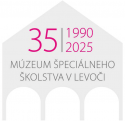Communication and speech
The deficiencies in speech and communication in children with autism are manifested not only by the delayed start of the development of speech, but also by the fact that their speech is developed in a completely different way compared to healthy children. Some children do not even begin to talk at all, and they do not have any need to compensate this deficiency by any other means of communication, for example by using gestures. They lack the innate ability to understand the importance of communication as a means of exchanging the information with the surroundings.
If the speech has been developed, the child may have a fairly extensive vocabulary but can not functionally use it and often learn the words by heart and mechanically. The speech is often echolalic, and the child answers the question by repeating the question. The people with autism also suffer with a problem with the use of pronouns and palilalia, which means repeating own or others’ phrases without obvious reason.
When communicating too long and using complicated sentences it may confuse a person with autism, even cause frustration, which may lead to isolation and problematic behavior.


